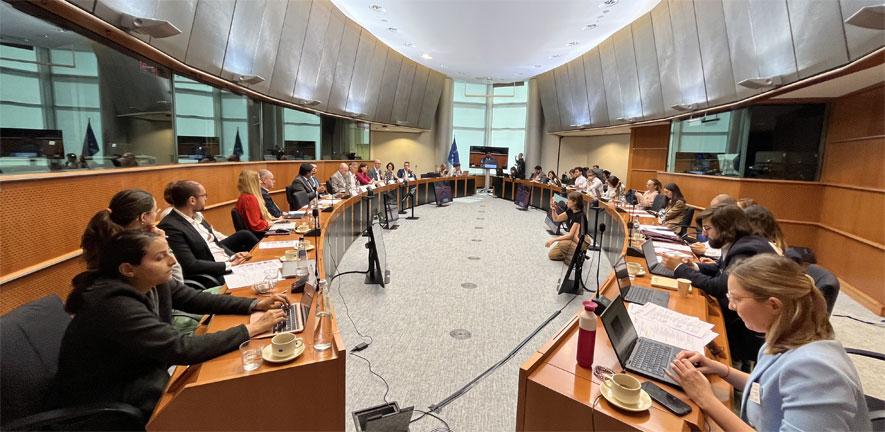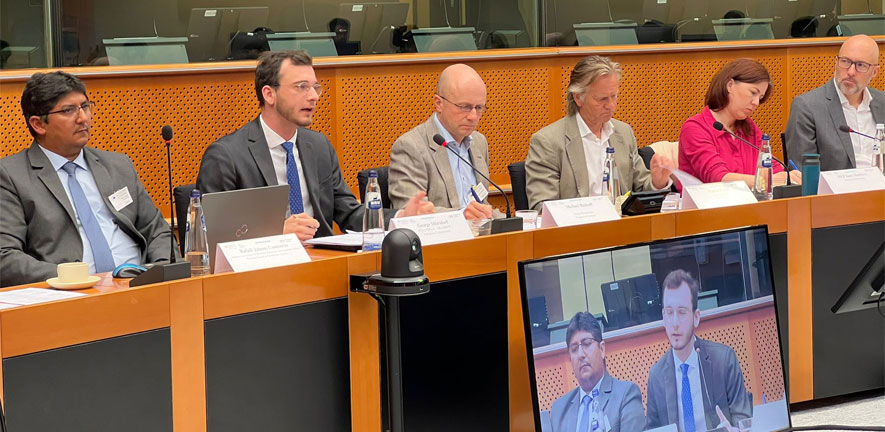
July 2023 – This week, the Taskforce for Climate Neutral and Circular Materials and Products hosted a hybrid event at the European Parliament to mark the launch of their report “Embracing circularity: A pathway for strengthening the Critical Raw Materials Act,” in collaboration with the Wuppertal Institute. The report emphasized the importance of circular practices in achieving the European Union’s climate neutrality targets, presenting case studies from business members including Volvo and Hydro, and recommendations on key materials, sparking discussions among stakeholders from industry, academia, and NGOs.
Read the report launch summary.
This high-profile event was held on 17 July at the European Parliament, bringing together key stakeholders from industry, academia, the European Union (EU), and NGOs to discuss the importance of circularity in achieving the EU's climate neutrality targets. The focal point of the event was the launch of a new ground-breaking report, presenting a comprehensive outlook on circular practices and their potential impact on the EU’s Critical Raw Materials Act (CRMA).
Circularity, an essential aspect of the EU's climate neutrality ambitions, requires significant advancement in circular practices across all sectors of the economy. While the CRMA has set a recycling target of 15%, the newly launched report emphasizes that much more can be achieved through embracing the full potential of circularity. Beyond mere recycling, circularity involves exploring innovative ways to maintain the value of materials within the system for longer periods effectively. The report highlights that the current CRMA proposal fails to address this crucial aspect of circularity.
The event provided a platform for key stakeholders to share their perspectives on circularity strategies and the significance of the report in advancing discussions on circularity and CRMA. Hosted by MEP Sara Matthieu, Shadow Rapporteur of the ENVI Committee on the CRMA, the event saw the active participation of 40 attendees in person and 433 participants joining online via GoToWebinar LinkedInLive.
MEP Sara Matthieu emphasized the pivotal role of the report in propelling the discussion on circularity and CRMA forward. MEP Sirpa Pietikäinen sparked an engaging discussion among policymakers on strategically replacing and reusing critical raw materials. George Mörsdorf from the European Commission shed light on the Commission's efforts in coordinating CRMA-related actions among Member States. Rafael Jaimes Contreras from the Wallonia Export & Investment Agency advocated for a holistic approach that integrates circularity strategies and responsible sourcing. Helge Haakon Refsum from Hydro underscored the necessity of a comprehensive value chain approach in CRMA.
CLG Europe’s Taskforce for Climate Neutral and Circular Materials and Products, consisting of progressive businesses across various sectors and value chains, is committed to driving the development, implementation, and support of ambitious and future-proof policies and initiatives in Europe. Their objective is to transition rapidly from energy and resource-intensive material production to sustainable alternatives that minimize fossil fuel usage and greenhouse gas emissions.
Helge Haakon Refsum, Director Business Development, Hydro said: “We’re at a global crossroad, where we must enable industrial development in accordance with the limits for climate and nature. It is key to enable sustainable growth. We must explore industrial synergies – as already done today in the production of synthetic graphite. In addition, by recycling and reusing critical raw materials, we’ll strengthen security of supply, but also limit the need for greenfield mining projects.
To succeed, we need not only to come together on how to manage end-of-life products and how to reuse these precious minerals, but we also need a coherent public policy supporting the entire value chain.”
Professor Dr Manfred Fischedick, President and Scientific Managing Director of the Wuppertal Institute said: “Russia’s war on Ukraine and the Covid-19 pandemic have highlighted Europe’s high vulnerability – especially in the supply of raw materials, which today is largely import-based. In principle, the EU has the potential to become more independent. However, this would entail higher raw material prices, and mining activities inevitably encroach on nature and landscapes. Circular economy is the better alternative. It can help provide needed materials efficiently and keep extraction of primary raw materials to a minimum. If policymakers set a clear framework for this, it can be the basis for high security of supply and a greener and socially responsible economy.”
Linnea Petersson, Manager Sustainable Materials Strategy, Volvo Cars said: “This is a comprehensive report on critical raw materials covering a multitude of vital aspects such as geopolitics, policies and business case studies. The message is clear: The European economy needs increased focus on all circular economy aspects to produce and use critical raw materials more sustainably.”
The event successfully brought together experts and stakeholders from diverse backgrounds, facilitating constructive conversations on how embracing circularity can strengthen the Critical Raw Materials Act and accelerate the EU's progress towards climate neutrality. As the EU moves forward with its climate ambitions, the insights and recommendations from this high-level event are expected to play a significant role in shaping future policies and actions concerning critical raw materials.





